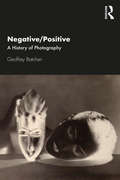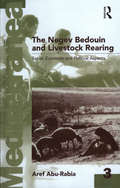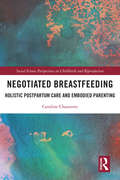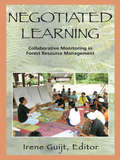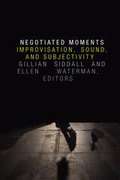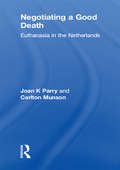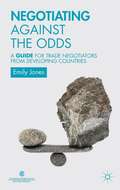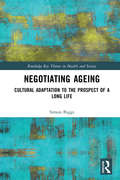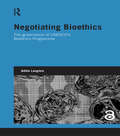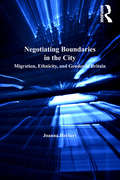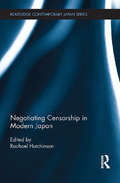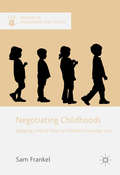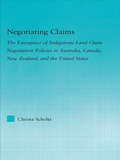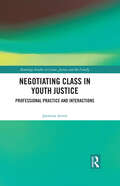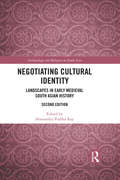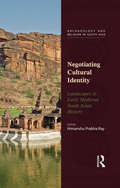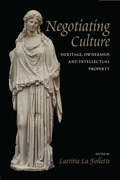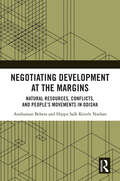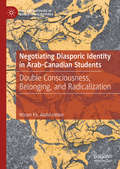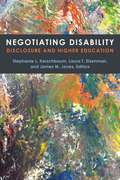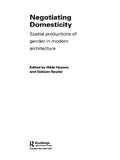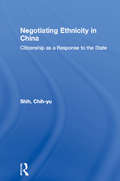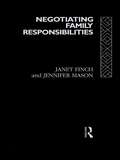- Table View
- List View
Negative/Positive: A History of Photography
by Geoffrey BatchenAs its title suggests, Negative/Positive begins with the negative, a foundational element of analog photography that is nonetheless usually ignored, and uses this to tell a representative, rather than comprehensive, history of the medium. The fact that a photograph is split between negative and positive manifestations means that its identity is always simultaneously divided and multiplied. The interaction of these two components was often spread out over time and space and could involve more than one person, giving photography the capacity to produce multiple copies of a given image and for that image to have many different looks, sizes and makers. This book traces these complications for canonical images by such figures as William Henry Fox Talbot, Kusakabe Kimbei, Dorothea Lange, Man Ray, Seydou Keïta, Richard Avedon, and Andreas Gursky. But it also considers a number of related issues crucial to any understanding of photography, from the business practices of professional photographers to the repetition of pose and setting that is so central to certain familiar photographic genres. Ranging from the daguerreotype to the digital image, the end result is a kind of little history of photography, partial and episodic, but no less significant a rendition of the photographic experience for being so. This book represents a summation of Batchen’s work to date, making it be essential reading for students and scholars of photography and for all those interested in the history of the medium
Negative Psychoanalysis for the Living Dead: Philosophical Pessimism and the Death Drive
by Julie ResheThis book offers a radical alternative to the positive orientation of popular psychology. This positive orientation has been criticized numerous times. However, there has yet to be a coherent alternative proposed. We all know today that life hurts and that there is no ultimate remedy to this pain. The positive approach feels to us as dishonest and irrelevant. We require a new, more negative, perspective and practice, one that is honest and does not pretend to offer an escape from the agonies of the world. This book offers in three main chapters a ‘depressive realist’ perspective that explores the structural role of negativity and tragedy in relation to the individual psyche, society, and nature. It explores the possibility of ‘negative psychoanalysis’ which takes into account the tragedy of human existence instead of adopting escapist positions.
Negev Bedouin and Livestock Rearing: Social, Economic and Political Aspects
by Aref Abu-RabiaIn the past sheep-rearing was the main means of existence for most Bedouin. Today it is developing in a new direction. For some it is as important as ever, for others it has become only a subsidiary source of income and a safeguard against economic instability. This volume looks at the effects social, political and economic change has had upon the traditional livelihood of the Negev Bedouin. The author considers how, despite all the problems encountered - such as the expropriation of land by the authorities and the demolition of authorized dwellings - sheep-rearing is still considered to be essential and worthwhile for almost all households. Co-operation between the owners of flocks, shepherds, food suppliers and government officials is essential in the determination of grazing areas and pastoral arrangements. These varied interest groups ensure that sheep-rearing continues to occupy an important place in the Bedouin's cultural identity and the flock remains a unifying factor for the Bedouin family and Israeli society.
Negotiated Breastfeeding: Holistic Postpartum Care and Embodied Parenting (Social Science Perspectives on Childbirth and Reproduction)
by Caroline ChautemsBased on an ethnography of postpartum consultations by independent midwives in Switzerland, this book produces unique insights into home-birth parents’ breastfeeding journey from the first hours after birth to weaning. Considered the "natural" continuity of childbirth without intervention, breastfeeding is a fundamental component of the holistic, continuous and individualised care independent midwives provide as they engage with parents in a shared construction of meaning around breastfeeding. This book offers new perspectives on the conceptualisation of breastfeeding as a shared process. Parents, in collaboration with their midwife and baby, are jointly constructing "negotiated breastfeeding". As the child grows and develops, questions arise regarding the management of risks, the construction of the lactating body and the body work required, and the perception of breastfeeding as a means of communication with the child, consistent with a "child-centred" approach to parenting. Fostering a reflection on the contrasts and similarities between the marginal model of holistic care and the dominant biomedical model, this book sheds light on issues of a broader scope: the relationship to health risks and health promotion, gender inequalities regarding parental roles and responsibilities, the concept of the child as a "project", and the consequential "intensification" of parenthood. The book also explores transversal themes by outlining how reproduction and parenting are undertaken in Switzerland, framed by the local cultural, political and economic context, including the gender system and resulting power relationships.
Negotiated Learning: Collaborative Monitoring for Forest Resource Management
by Irene GuijtThe first book to critically examine how monitoring can be an effective tool in participatory resource management, Negotiated Learning draws on the first-hand experiences of researchers and development professionals in eleven countries in Africa, Asia, and South America. Collective monitoring shifts the emphasis of development and conservation professionals from externally defined programs to a locally relevant process. It focuses on community participation in the selection of the indicators to be monitored as well as community participation in the learning and application of knowledge from the data that is collected. As with other aspects of collaborative management, collaborative monitoring emphasizes building local capacity so that communities can gradually assume full responsibility for the management of their resources. The cases in Negotiated Learning highlight best practices, but stress that collaborative monitoring is a relatively new area of theory and practice. The cases focus on four themes: the challenge of data-driven monitoring in forest systems that supply multiple products and serve diverse functions and stakeholders; the importance of building upon existing dialogue and learning systems; the need to better understand social and political differences among local users and other stakeholders; and the need to ensure the continuing adaptiveness of monitoring systems.
Negotiated Moments: Improvisation, Sound, and Subjectivity
by Gillian Siddall Ellen WatermanThe contributors to Negotiated Moments explore how subjectivity is formed and expressed through musical improvisation, tracing the ways the transmission and reception of sound occur within and between bodies in real and virtual time and across memory, history, and space. They place the gendered, sexed, raced, classed, disabled, and technologized body at the center of critical improvisation studies and move beyond the field's tendency toward celebrating improvisation's utopian and democratic ideals by highlighting the improvisation of marginalized subjects. Rejecting a singular theory of improvisational agency, the contributors show how improvisation helps people gain hard-won and highly contingent agency. Essays include analyses of the role of the body and technology in performance, improvisation's ability to disrupt power relations, Pauline Oliveros's ideas about listening, flautist Nicole Mitchell's compositions based on Octavia Butler's science fiction, and an interview with Judith Butler about the relationship between her work and improvisation. The contributors' close attention to improvisation provides a touchstone for examining subjectivities and offers ways to hear the full spectrum of ideas that sound out from and resonate within and across bodies. Contributors. George Blake, David Borgo, Judith Butler, Rebecca Caines, Louise Campbell, Illa Carrillo Rodríguez, Berenice Corti, Andrew Raffo Dewar, Nina Eidsheim, Tomie Hahn, Jaclyn Heyen, Christine Sun Kim, Catherine Lee, Andra McCartney, Tracy McMullen, Kevin McNeilly, Leaf Miller, Jovana Milovic, François Mouillot, Pauline Oliveros, Jason Robinson, Neil Rolnick, Simon Rose, Gillian Siddall, Julie Dawn Smith, Jesse Stewart, Clara Tomaz, Sherrie Tucker, Lindsay Vogt, Zachary Wallmark, Ellen Waterman, David Whalen, Pete Williams, Deborah Wong, Mandy-Suzanne Wong
Negotiating a Good Death: Euthanasia in the Netherlands
by Joan K Parry Carlton MunsonSocial Work Theory and Practice with the Terminally Ill, second edition, takes a compassionate look at ways that social workers can help dying people and their families. The social workers who work most effectively with terminally ill patients and their families are the ones who best understand the multifaceted nature of the dying process and its impact on the the patient, the family, and even on the health care professionals who work with patients at the end of life. Dr. Parry--who specializes in dying and bereavement--offers astute observations on the stages of dealing with the diagnosis of a terminal illness and the impending death that patients and their families confront. This updated second edition provides valuable new information on ways that social workers can help those with AIDS and their families, on traumatic death from any cause, and on the grieving processes of parents.Social Work Theory and Practice with the Terminally Ill, second edition, also includes stimulating discussions on: the interdisciplinary health team the grieving process professional burnout how social workers adapt to working with dying patients euthanasia and physician-assisted dying living wills and patients’rightsIn touching case studies, this volume illustrates the particular needs and concerns of the terminally ill and their families--impending losses, financial worries, job concerns, pain, unfinished business, and spiritual needs--and reviews successful interventions used by social workers to help patients and their families work through the dying process.
Negotiating Against the Odds
by Emily JonesDrawing on the experiences of more than 100 developing country negotiators and the insights of leading academic studies, this guide brings together practical advice and lessons on ways to negotiate effectively with larger parties, and avoid common pitfalls.
Negotiating Ageing: Cultural Adaptation to the Prospect of a Long Life (Routledge Key Themes in Health and Society)
by Simon BiggsThe world is growing older and this is a historically unprecedented phenomenon. Negotiating such change, personally, socially and for governments and international organisations requires an act of cultural adaptation. Two key questions arise: What is the purpose of a long life? and How do we adapt to societies where generations are of approximately the same size? A number of pre-existing narratives can be identified; however, it is argued that contemporary policies have produced a premature answer which may eclipse the potential arising from lifecourse change. In this book Simon Biggs discusses ways of interrogating these questions and the adaptations we make to them. Four major areas, all of which have been suggested as solutions to population ageing, are critically assessed, including work as an answer, the relationship between work, ageing and health, narratives of spirit, belief and wisdom, the body and the natural, anti-ageing medicine, critical approaches to dementia, plus family and intergenerational relations. This book is particiularly useful for those trying to make sense of population ageing and negotiate solutions. It describes a number of concepts that can be used to assess what we are told about a long life and how generations can adapt together. With the cultural landscape moving away from traditional interpretations of old age, the question of adult ageing is of growing interest to a number of groups. This book is essential reading for social and health-care workers, other helping professionals, policy makers, social scientists and all who encounter the prospect of a long life.
Negotiating Bioethics: The Governance of UNESCO’s Bioethics Programme (Genetics and Society)
by Adèle LangloisA PDF version of this book is available for free in Open Access at www.tandfebooks.com. It has been made available under a Creative Commons Attribution-Non Commercial-No Derivatives 3.0 license. The sequencing of the entire human genome has opened up unprecedented possibilities for healthcare, but also ethical and social dilemmas about how these can be achieved, particularly in developing countries. UNESCO’s Bioethics Programme was established to address such issues in 1993. Since then, it has adopted three declarations on human genetics and bioethics (1997, 2003 and 2005), set up numerous training programmes around the world and debated the need for an international convention on human reproductive cloning. Negotiating Bioethics presents Langlois' research on the negotiation and implementation of the three declarations and the human cloning debate, based on fieldwork carried out in Kenya, South Africa, France and the UK, among policy-makers, geneticists, ethicists, civil society representatives and industry professionals. The book examines whether the UNESCO Bioethics Programme is an effective forum for (a) decision-making on bioethics issues and (b) ensuring ethical practice. Considering two different aspects of the UNESCO Bioethics Programme – deliberation and implementation – at international and national levels, Langlois explores: how relations between developed and developing countries can be made more equal who should be involved in global level decision-making and how this should proceed how overlap between initiatives can be avoided what can be done to improve the implementation of international norms by sovereign states how far universal norms can be contextualized what impact the efficacy of national level governance has at international level
Negotiating Boundaries in the City: Migration, Ethnicity, and Gender in Britain (Studies in Migration and Diaspora)
by Joanna HerbertUsing in-depth life-story interviews and oral history archives, this book explores the impact of South Asian migration from the 1950s onwards on both the local white, British-born population and the migrants themselves. Taking Leicester as a main case study - identified as a European model of multicultural success - Negotiating Boundaries in the City offers a historically grounded analysis of the human experiences of migration. Joanna Herbert shows how migration created challenges for both existing residents and newcomers - for both male and female migrants - and explores how they perceived and negotiated boundaries within the local contexts of their everyday lives. She explores the personal and collective narratives of individuals who might not otherwise appear in the historical records, highlighting the importance of subjective, everyday experiences. The stories provide valuable insights into the nature of white ethnicity, inter-ethnic relations and the gendered nature of experiences, and offer rich data lacking in existing theoretical accounts. This book provides a radically different story about multicultural Britain and reveals the nuances of modern urban experiences which are lost in prevailing discourses of multiculturalism.
Negotiating Censorship in Modern Japan (Routledge Contemporary Japan Series)
by Rachael HutchinsonCensorship in Japan has seen many changes over the last 150 years and each successive system of rule has possessed its own censorship laws, regulations, and methods of enforcement. Yet what has remained constant through these many upheavals has been the process of negotiation between censor and artist that can be seen across the cultural media of modern society. By exploring censorship in a number of different Japanese art forms – from popular music and kabuki performance through to fiction, poetry and film – across a range of historical periods, this book provides a striking picture of the pervasiveness and strength of Japanese censorship across a range of media; the similar tactics used by artists of different media to negotiate censorship boundaries; and how censors from different systems and time periods face many of the same problems and questions in their work. The essays in this collection highlight the complexities of the censorship process by investigating the responsibilities and choices of all four groups – artists, censors, audience and ideologues – in a wide range of case studies. The contributors shift the focus away from top-down suppression, towards the more complex negotiations involved in the many stages of an artistic work, all of which involve movement within boundaries, as well as testing of those boundaries, on the part of both artist and censor. Taken together, the essays in this book demonstrate that censorship at every stage involves an act of human judgment, in a context determined by political, economic and ideological factors. This book and its case studies provide a fascinating insight into the dynamics of censorship and how these operate on both people and texts. As such, it will be of great interest to students and scholars interested in Japanese studies, Japanese culture, society and history, and media studies more generally.
Negotiating Childhoods: Applying A Moral Filter To Children S Everyday Lives (Studies In Childhood And Youth Series)
by Sam FrankelThis book investigates how constructed representations of the child have and continue to restrict children's opportunities to engage in moral discourses, and the implications this has on children's everyday experiences. By considering a moral dimension to both structure and agency, the author focuses on the nature of the images that are used to represent the child and how these sit in contrast to the active and meaning-driven way in which children negotiate their everyday lives. The book therefore argues that 'morality' provides a filter to understand the backdrop for interaction, as well as offering a focus for engaging with the individual as a social agent, acting and reacting in the world around them. Negotiating Childhoods will be of interest to students and scholars of sociology, childhood studies, criminology, social work, culture and media studies and philosophy.
Negotiating Claims: The Emergence of Indigenous Land Claim Negotiation Policies in Australia, Canada, New Zealand, and the United States (Indigenous Peoples and Politics)
by Christa ScholtzWhy do governments choose to negotiate indigenous land claims rather than resolve claims through some other means? In this book Scholtz explores why a government would choose to implement a negotiation policy, where it commits itself to a long-run strategy of negotiation over a number of claims and over a significant course of time. Through an examination strongly grounded in archival research of post-World War Two government decision-making in four established democracies - Australia, Canada, New Zealand, and the United States - Scholtz argues that negotiation policies emerge when indigenous people mobilize politically prior to significant judicial determinations on land rights, and not after judicial change alone. Negotiating Claims links collective action and judicial change to explain the emergence of new policy institutions.
Negotiating Class in Youth Justice: Professional Practice and Interactions (Routledge Studies in Crime, Justice and the Family)
by Jasmina ArnežThis book examines how class shapes interactions between professionals, parents, and young people in the youth justice system, utilising a mix of contemporary social theory and a wealth of empirical material. It suggests ways to neutralise the effects of class on youth justice interventions in structurally unequal societies and argues for reform based on conceptions of negotiated justice, relational agency, and autonomy in dependence. The author develops a theoretical framework to explore how class is negotiated within youth justice, taking as its starting point the work of Bourdieu on habitus, Boltanski and Thévenot on the sociology of lay normativity, and Sayer’s work on moral understandings of class. This is combined with a detailed reading of empirical material gathered through focus groups, interviews with practitioners, parents and children, and participant observation of parenting courses. The result is an innovative revisiting of the part that social class plays in determining who is diverted into and away from youth justice and a sustained theoretical and empirical argument for the continued importance of class in criminological research. This book offers an original contribution to the fields of criminology, youth justice, and crime and the family. It provides an important source of knowledge for academics and practitioners interested in discussions on social class and indirect discrimination.
Negotiating Clerical Identities
by Jennifer D. ThibodeauxClerics in the Middle Ages were subjected to differing ideals of masculinity, both from within the Church and from lay society. The historians in this volume interrogate the meaning of masculine identity for the medieval clergy, by considering a wide range of sources, time periods and geographical contexts.
Negotiating Cultural Identity: Landscapes in Early Medieval South Asian History (Archaeology and Religion in South Asia)
by Himanshu Prabha RayThis volume breaks new ground by conceptualizing physical landscapes as living cultural bodies. It redefines dynamic cultural landscapes as catalysts in which the natural world and human practice are inextricably linked and are constantly interacting. Drawing on research by eminent archaeologists, numismatists and historians, the essays in this volume • Provide insights into the ways people in the past, and in the present, imbue places with meanings; • Examine the social and cultural construction of space in the early medieval period in South Asia; • Trace complex patterns of historical development of a temple or a town, to understand ways in which such spaces often become a means of constructing the collective past and social traditions. With a new chapter on continuity and change in the sacred landscape of the Buddhist site at Udayagiri, the second edition of Negotiating Cultural Identity will be of immense interest to scholars and researchers of archaeology, social history, cultural studies, art history and anthropology.
Negotiating Cultural Identity: Landscapes in Early Medieval South Asian History (Archaeology and Religion in South Asia)
by Himanshu Prabha RayThis volume breaks new ground by conceptualizing landscape as a dynamic cultural complex in which the natural world and human practice are inextricably linked and are constantly interacting. It examines the social and cultural construction of space in the early medieval period in South Asia, as manifest in society, religious architecture and as shaped through trade and economic transactions.
Negotiating Culture: Heritage, Ownership, and Intellectual Property
by Laetitia La FolletteRival claims of ownership or control over various aspects of culture are a regular feature of our twenty-first-century world. Such debates are shaping disciplines as diverse as anthropology and archaeology, art history and museum studies, linguistics and genetics. This provocative collection of essays--a series of case studies in cultural ownership by scholars from a range of fields--explores issues of cultural heritage and intellectual property in a variety of contexts, from contests over tangible artifacts as well as more abstract forms of culture such as language and oral traditions to current studies of DNA and genes that combine nature and culture, and even new, nonproprietary models for the sharing of digital technologies. Each chapter sets the debate in its historical and disciplinary context and suggests how the approaches to these issues are changing or should change. One of the most innovative aspects of the volume is the way each author recognizes the social dimensions of group ownership and demonstrates the need for negotiation and new models. The collection as a whole thus challenges the reader to reevaluate traditional ways of thinking about cultural ownership and to examine the broader social contexts within which negotiation over the ownership of culture is taking place. In addition to Laetitia La Follette, contributors include David Bollier, Stephen Clingman, Susan DiGiacomo, Oriol Pi-Sunyer, Margaret Speas, Banu Subramaniam, Joe Watkins, and H. Martin Wobst.
Negotiating Development at the Margins: Natural Resources, Conflicts, and People’s Movements in Odisha
by Anshuman Behera Hippu Salk NathanThis book critically examines various facets of conflicts involving people and the state arising due to the uneven distribution of natural resources. It provides an overview of the people’s movements in Odisha, a resource-rich state in eastern India. Reflecting on the conceptual frameworks of conflict, it analyses violence, and struggle for rights over resources, and public policies around natural resources, alongside local strategies and governance. Drawing from extensive field surveys in the villages of Kalahandi and undivided Koraput districts in Odisha, this volume explores the sociopolitical and economical aspects of people’s movements instead of solely viewing them as political and security threats. The authors demonstrate the misappropriations of these movements by both the state and non-state actors for their vested interests. This book offers recommendations for policymakers to draw up a more ready response to mitigate and minimize the conflict and violence and implement equitable policies around land and resources. While doing so, the book also provides some primers to development perspectives, the role of natural resources and conditions under which the natural resources can result in conflict, and principles and practices to overcome such conflicts. The volume will be an indispensable read for researchers and students of social history, social reform, tribal and indigenous studies, postcolonial studies, exclusion studies, development studies, political sociology, and South Asian studies.
Negotiating Diasporic Identity in Arab-Canadian Students: Double Consciousness, Belonging, and Radicalization (Palgrave Studies in Educational Futures)
by Wisam Kh. Abdul-JabbarThis book, framed through the notion of double consciousness, brings postcolonial constructs to sociopolitical and pedagogical studies of youth that have yet to find serious traction in education. Significantly, this book contributes to a growing interest among educational and curriculum scholars in engaging the pedagogical role of literature in the theorization of an inclusive curriculum. Therefore, this study not only recognizes the potential of immigrant literature in provoking critical conversation on changes young people undergo in diaspora, but also explores how the curriculum is informed by the diasporic condition itself as demonstrated by this negotiation of foreignness between the student and selected texts.
Negotiating Disability: Disclosure and Higher Education
by Stephanie L Kerschbaum Laura T Eisenman James M JonesDisability is not always central to claims about diversity and inclusion in higher education, but should be. This collection reveals the pervasiveness of disability issues and considerations within many higher education populations and settings, from classrooms to physical environments to policy impacts on students, faculty, administrators, and staff. While disclosing one’s disability and identifying shared experiences can engender moments of solidarity, the situation is always complicated by the intersecting factors of race and ethnicity, gender, sexuality, and class. With disability disclosure as a central point of departure, this collection of essays builds on scholarship that highlights the deeply rhetorical nature of disclosure and embodied movement, emphasizing disability disclosure as a complex calculus in which degrees of perceptibility are dependent on contexts, types of interactions that are unfolding, interlocutors’ long- and short-term goals, disabilities, and disability experiences, and many other contingencies.
Negotiating Domesticity: Spatial Productions of Gender in Modern Architecture
by Hilde Heynen Gülsüm BaydarIn the home the intricate relations between architecture, gender and domesticity become visible. Negotiating Domesticity investigates the many and complex themes evoked by the interconnections between these terms. Topics covered include famous as well as less well-known architectural examples and architects, which are explored from sociological, anthropological, philosophical and psychoanalytical approaches. The authors explore the relationships between modern domestic spaces and sexed subjectivities in a broad range of geographical locations of Western modernity. This richly interdisiplinary work presents architects and postgraduate students with an in-depth exploration of domesticity in the modern era.
Negotiating Ethnicity in China: Citizenship as a Response to the State (Routledge Studies on China in Transition)
by Chih-yu ShihThis challenging study brings together anthropology and political science to examine how ethnic minorities are constructed by the state, and how they respond to such constructions.Disclosing endless mini negotiations between those acting in the name of the Chinese state and those carrying the images of ethnic minority, this book provides an image of the framing of ethnicity by modern state building processes. It will be of vital interest to scholars of political science, anthropology and sociology, and is essential reading to those engaged in studying Chinese society.
Negotiating Family Responsibilities
by Janet Finch Professor Janet Finch Jennifer MasonNegotiating Family Responsibilities provides a major new insight into contemporary family life, particularly kin relationships outside the nuclear family. While many people believe that the real meaning of 'family' has shrunk to the nuclear family household, there is considerable evidence to suggest that relationships with the wider kin group remain an important part of most people's lives. Based on the findings of a major study of kinship, and including lively verbatim accounts of conversations with family members concepts of responsibility and obligation within family life are examined and the authors expand theories on the nature of assistance within families and argue that it is negotiated over time rather than given automatically.
